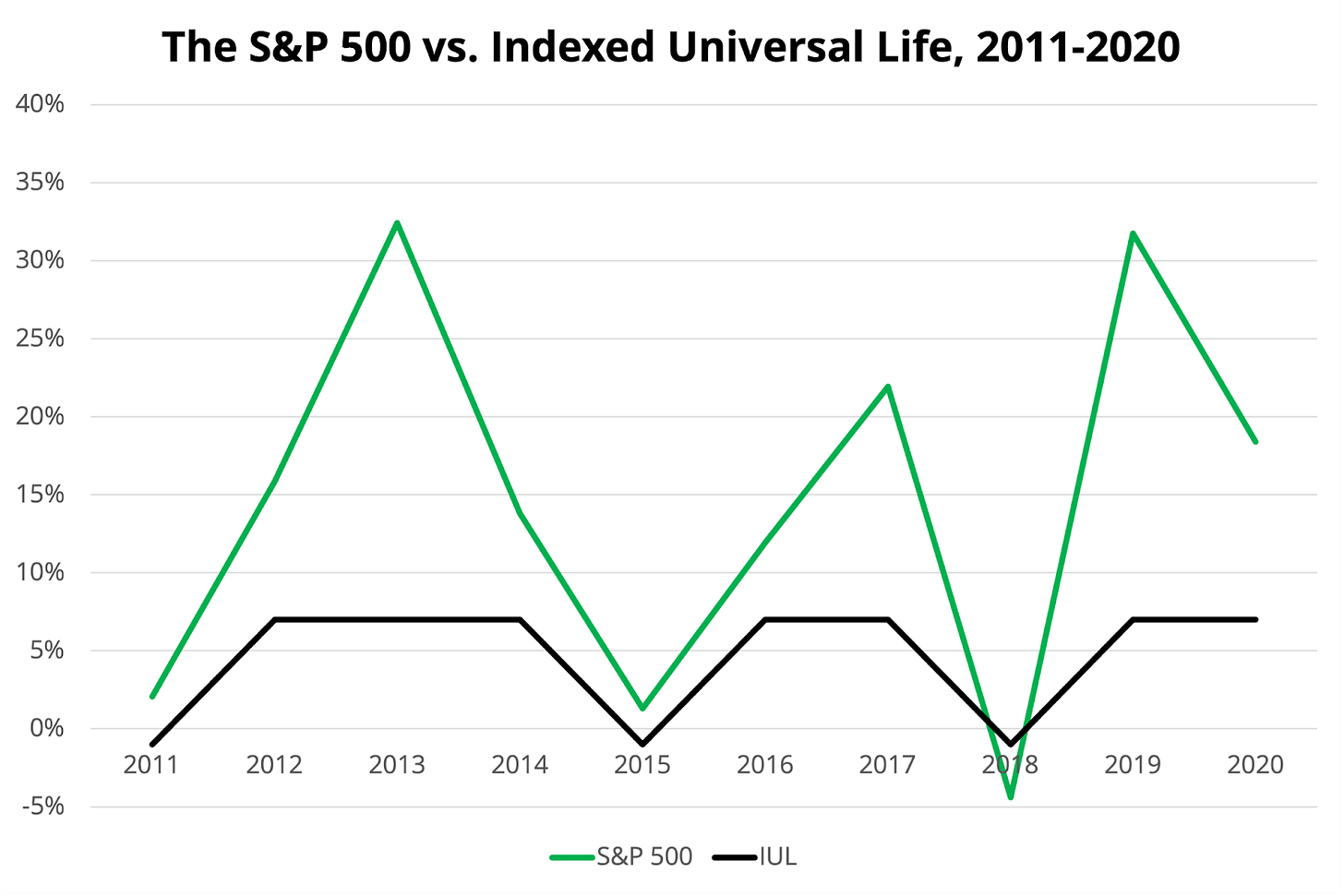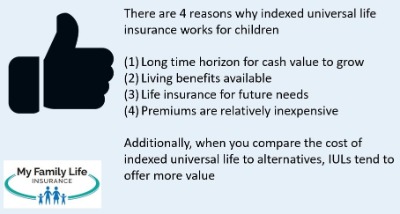All Categories
Featured
Table of Contents
Do they compare the IUL to something like the Vanguard Overall Stock Market Fund Admiral Shares with no load, an expense proportion (EMERGENCY ROOM) of 5 basis points, a turnover proportion of 4.3%, and a remarkable tax-efficient document of distributions? No, they compare it to some dreadful actively handled fund with an 8% tons, a 2% ER, an 80% turnover ratio, and a horrible record of temporary capital gain circulations.
Mutual funds commonly make annual taxed circulations to fund owners, also when the value of their fund has actually decreased in value. Common funds not only require revenue coverage (and the resulting yearly taxes) when the common fund is going up in value, however can likewise enforce revenue tax obligations in a year when the fund has dropped in value.
That's not how common funds work. You can tax-manage the fund, collecting losses and gains in order to lessen taxable distributions to the capitalists, yet that isn't in some way going to transform the reported return of the fund. Just Bernie Madoff types can do that. IULs stay clear of myriad tax obligation catches. The ownership of common funds may require the mutual fund owner to pay approximated tax obligations.

IULs are simple to position to make sure that, at the owner's death, the beneficiary is exempt to either earnings or estate tax obligations. The very same tax decrease methods do not work nearly as well with shared funds. There are countless, usually costly, tax obligation catches connected with the moment buying and selling of mutual fund shares, catches that do not relate to indexed life Insurance.
Possibilities aren't very high that you're going to undergo the AMT as a result of your shared fund circulations if you aren't without them. The rest of this one is half-truths at best. While it is real that there is no revenue tax obligation due to your successors when they acquire the proceeds of your IUL policy, it is likewise true that there is no income tax obligation due to your beneficiaries when they inherit a mutual fund in a taxable account from you.
Maximum Funded Life Insurance Contract
There are much better ways to prevent estate tax obligation issues than buying financial investments with low returns. Mutual funds might cause earnings taxation of Social Security benefits.

The development within the IUL is tax-deferred and might be taken as tax free income through finances. The policy proprietor (vs. the common fund supervisor) is in control of his or her reportable revenue, thus allowing them to decrease or perhaps get rid of the taxation of their Social Safety benefits. This is wonderful.
Below's another marginal issue. It holds true if you buy a common fund for claim $10 per share right before the circulation date, and it distributes a $0.50 circulation, you are after that going to owe taxes (probably 7-10 cents per share) in spite of the fact that you haven't yet had any type of gains.
In the end, it's actually concerning the after-tax return, not just how much you pay in tax obligations. You are mosting likely to pay even more in tax obligations by making use of a taxed account than if you acquire life insurance coverage. You're additionally most likely going to have even more money after paying those tax obligations. The record-keeping requirements for having common funds are significantly much more complicated.
With an IUL, one's documents are kept by the insurance coverage business, copies of annual statements are mailed to the proprietor, and distributions (if any type of) are completed and reported at year end. This set is likewise type of silly. Of program you should maintain your tax documents in situation of an audit.
Cost Universal Life Insurance
All you have to do is push the paper into your tax folder when it shows up in the mail. Hardly a factor to acquire life insurance. It resembles this guy has actually never ever purchased a taxable account or something. Common funds are commonly component of a decedent's probated estate.
Furthermore, they are subject to the delays and expenditures of probate. The proceeds of the IUL plan, on the other hand, is constantly a non-probate distribution that passes beyond probate straight to one's called beneficiaries, and is as a result exempt to one's posthumous financial institutions, undesirable public disclosure, or similar delays and expenses.
We covered this one under # 7, but simply to recap, if you have a taxed mutual fund account, you should place it in a revocable trust (or even simpler, make use of the Transfer on Fatality classification) to avoid probate. Medicaid incompetency and life time revenue. An IUL can give their proprietors with a stream of earnings for their entire life time, no matter for how long they live.

This is helpful when arranging one's events, and transforming properties to earnings prior to an assisted living home confinement. Common funds can not be converted in a similar way, and are usually taken into consideration countable Medicaid properties. This is an additional dumb one promoting that inadequate individuals (you understand, the ones who require Medicaid, a government program for the poor, to pay for their retirement home) need to make use of IUL rather of mutual funds.
Universal Life Insurance Cash Surrender Value
And life insurance policy looks horrible when contrasted fairly against a pension. Second, individuals who have money to get IUL over and past their retirement accounts are going to need to be horrible at managing cash in order to ever receive Medicaid to spend for their assisted living home prices.
Chronic and terminal health problem biker. All plans will certainly enable an owner's very easy access to cash money from their plan, commonly waiving any kind of abandonment fines when such people suffer a serious ailment, need at-home care, or come to be restricted to an assisted living facility. Common funds do not provide a similar waiver when contingent deferred sales costs still use to a common fund account whose owner requires to offer some shares to fund the expenses of such a remain.
Iul For Retirement
You obtain to pay even more for that benefit (biker) with an insurance coverage plan. Indexed global life insurance policy provides fatality advantages to the beneficiaries of the IUL owners, and neither the proprietor neither the recipient can ever before shed money due to a down market.
Currently, ask on your own, do you in fact require or want a death advantage? I absolutely do not need one after I reach financial independence. Do I want one? I intend if it were cheap enough. Of course, it isn't inexpensive. Typically, a purchaser of life insurance policy pays for truth expense of the life insurance advantage, plus the prices of the plan, plus the profits of the insurer.
Universal Life Insurance For Seniors
I'm not completely sure why Mr. Morais included the whole "you can't lose money" once again below as it was covered rather well in # 1. He just wished to duplicate the ideal marketing point for these things I suppose. Once more, you don't shed small bucks, but you can lose genuine bucks, along with face significant possibility price as a result of low returns.

An indexed global life insurance plan owner might trade their plan for a completely various policy without setting off earnings tax obligations. A shared fund owner can stagnate funds from one mutual fund company to an additional without marketing his shares at the previous (therefore causing a taxed occasion), and repurchasing brand-new shares at the last, typically based on sales fees at both.
While it holds true that you can exchange one insurance plan for an additional, the factor that people do this is that the initial one is such a dreadful policy that also after acquiring a brand-new one and going with the early, negative return years, you'll still come out ahead. If they were offered the right plan the very first time, they should not have any kind of need to ever trade it and go with the very early, negative return years once again.
Latest Posts
Index Life Insurance Vs Roth Ira
Nationwide Universal Life
Best Universal Life Insurance Companies